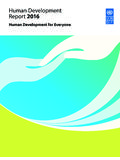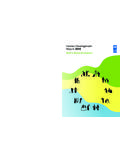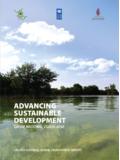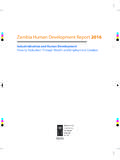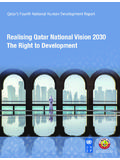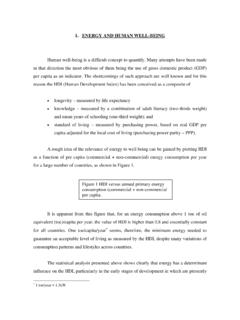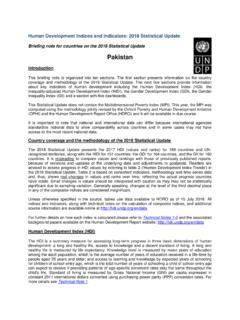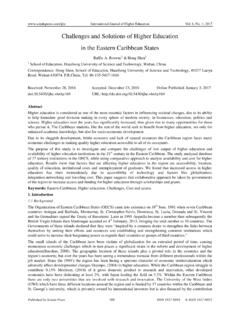Transcription of The Rise of the Global South - United Nations Development ...
1 OCCASIONAL PAPER 2013/08 Human Development Report OfficeHuman Development Report OfficeUnited NationsDevelopment ProgrammeUnited NationsDevelopment ProgrammeThe Rise of the Global South : Implications for the Provisioning of Global Public Goodsby Inge KaulUNDP Human Development Report Office304 E. 45th Street, 12th FloorNew York, NY 10017, USATel: +1 212-906-3661 Fax: +1 212-906-5161 2013by the United Nations Development Programme1 UN Plaza, New York, NY 10017, USAAll rights reserved. No part of this publication may be reproduced, stored in a retrieval system or transmitted, in any form or by any means, electronic, mechanical, photocopying, recording or otherwise without prior permission. This paper does not represent the official views of the United Nations Development Programme, and any errors or omissions are the authors Kaul is adjunct professor, Hertie School of Governance, Berlin and former Director of the Human Development Report Office and the Office of Development Studies of the UNDP in New York.
2 She has published widely on issues of Global governance and the financing of international cooperation and is the lead editor of Providing Global Public Goods: Managing Globalization (OUP, 2003) and The New Public Finance: Responding to Global Challenges (OUP, 2006), and is co-author of the Governance Report 2013 (OUP, 2013). Her current research focuses on Global public policy and Human Development Report Office OCCASIONAL PAPER 2013 /081 The Rise of the Global South : Implications for the Provisioning of Global Public GoodsINGE KAULABSTRACTThis paper assesses how the participation of developing countries in Global governance has evolved in recent decades and the impact this has had on international cooperation and the provisioning of Global public goods. The analysis shows that, as a group, developing countries have become increasingly active participants in Global policy-making. Moreover, they have used their influence not only to further their own narrowly defined national interests, but also to shape the Global normative framework.
3 They have emphasized concerns such as the fairness and justice of international negotiations, and fostering a better balance between growth and and more policy challenges are Global , such as the mitigation of climate change, communicable disease control, international financial stability, the fight against terrorism and nuclear non-proliferation. Economists categorize these challenges as Global public goods things or conditions that potentially affect many, if not all, countries. Market actors typically neglect their provision, and no country, however powerful, can address them alone. They require Global policy responses based on effective international challenges are increasingly urgent, pointing to the imperative of fundamentally reorienting current growth and Development strategies. There is the closing door opportu-nity of limiting Global warming to two degrees Celsius to stabilize the climate.
4 The end of oil within the next couple of decades implies developing alternative energy sources to achieve energy security. Other examples comprise land and water scarcity; ever-fiercer competition for market shares, and investment and job opportunities; growing Global inequity; and the persisting problems of nuclear proliferation, world hunger and poverty. These risks must be addressed expeditiously. As the World Economic Forum s report Global Risks 2011 warned, the world cannot afford any further major challenge, especially now that Global economic resilience has been weakened by the recent international financial international cooperation on the selection and provi-sioning of Global public goods continues to be slow, allowing problems to grow. Could a reason for this lagging progress be that the world is currently moving through profound changes in Global power relations, notably a shift towards multipolar-ity resulting from the growing economic and political strength of the emerging market economies?
5 Is this change impairing international cooperation in support of Global public goods? The present paper will explore these questions, focusing on the role of the Global South , particularly its state actors, in Global Section 1 introduces the notions of public goods and Global public goods, and analyses governance risks and demands. Section 2 discusses conditions for international cooperation to work effectively in the presence of Global public goods. It identifies five facilitating conditions: open and participatory international decision-making; Global governance based on the principle of subsidiarity; issue-specific negotiations; a globally embedded definition of national interest in a Global context; and legitimate Global policy leadership. With these criteria in mind and based on select empirical evidence, Section 3 then assesses how the 1 The present paper captures only one aspect, albeit an important one, of the role of the Global South in international cooperation.
6 A more detailed analysis, which is beyond the scope of this paper, would have to take into account the role that developing country scholars and think tanks like the South Centre or the Group of 24 (G24), national and international civil society, actors of the Global North with a special interest in develop-ment and Global equity, as well as multilateral organizations, especially the United Nations Conference on Trade and Development (UNCTAD), have played in facilitating the changes identified here. UNDP Human Development Report Office OCCASIONAL PAPER 2013 /0828 THE RISE OF THE Global South participation of developing countries in Global governance has evolved in recent decades, and the impact this has had on international cooperation and the provisioning of Global public goods. The analysis shows that, as a group, developing countries have become increasingly active participants in Global policy-making. Moreover, they have used their influence not only to further their own narrowly defined national interests, but also to shape the normative framework.
7 They have emphasized concerns such as enhancing the fairness and justice of inter-national negotiations, and fostering a better balance between growth and Development as well as public and private inter-ests. An example is their engagement in furthering policy coherence between protecting intellectual property rights and meeting public health goals. International cooperation now is more open and partici-patory, and thus more in line with conditions identified in this paper as favourable to effective Global public goods provi-sion. Nevertheless, progress is far from satisfactory, because the identified conditions have, so far, been only partially met. Countries of the Global South have moved forward at different speeds, with only some of them, mainly the more advanced emerging market countries, able to join the group of major Global policy-shapers. Many other countries are still Global policy takers.
8 Among the main factors holding back fuller participation appear to be capacity constraints and, no doubt often justified, sovereignty concerns. Also, developing countries have so far pursued a strategy of integration that accepts the existing system as a given fact. Yet signs are multiplying that this phase may soon be coming to an end. They also suggest that international coop-eration could become ever more difficult at a time when it is most urgently needed. The countries of the Global North have responded to the increasing power of the Global South as a Global policy-shaper with growing sovereignty concerns of their own. They have followed a strategy of venue shift-ing, taking issues of importance to them into forums like the Bretton Woods institutions, in which decision-making is still weighted in their favour, or by setting up informal, smaller negotiation venues where they can define the agenda as well as the circle of participants.
9 An early expression of this strategy was the creation of the Group of 7 (G7) major industrialized countries in the Another strategy has been growing reliance on bilateralism. Together with increasing South - South cooperation and regionalism, these trends have led to a 2 The G7 became the Group of 8 (G8) when the Russian Federation joined after the end of the Cold War. See world of multilateralism that, in the words of Haass (2010), is more fluid, less predictable, and consequently, messy. Is this messiness, as Haass argues, desirable? This paper suggests it is not. Due to a lack of transparency, predictability, and consequently, trust and legitimacy, the current messiness might encourage rivalry among states and zero-sum thinking. Fair, rule-based and accountable international cooperation would be the better strategy for all. The time appears to be ripe for the North and the South to enter into negotiations on redesigning Global governance to resolve today s sovereignty paradox : states losing national policy-making sovereignty, because they are holding on to a conventional notion of absolute sovereignty, and therefore giving preference to unilateralism, sometimes even protec-tionism.
10 The better strategy would be for all to realize their national public policy interests in establishing fair and effec-tive international cooperation. The world today lacks two critically important Global public goods that could function as international coordina-tion mechanisms of individual activity, state and non-state: a well-functioning system of multilateral cooperation and well-regulated international markets. That these two goods are underprovided may in part explain policy stalemates around so many Global challenges. Clearly, well-regulated markets depend on a well-func-tioning system of Global multilateral governance. States, first, need to agree on taming their temptation to free-ride in the presence of Global public goods before they muster the req-uisite willingness to cooperate to tame Global markets. After all, markets as institutions also have public good properties. They, too, are in the public domain and could potentially affect all, for better or worse.
